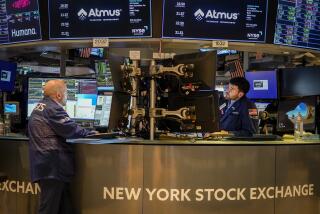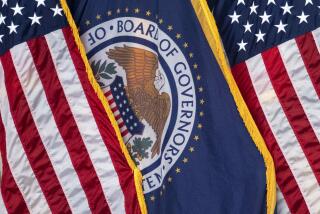White House, Fed Feud Over Rising Dollar
WASHINGTON — The Bush Administration is embroiled in another squabble with the Federal Reserve Board, this time over whether the United States should help stop the dollar’s recent rise and possibly push its value lower, U.S. officials said Saturday.
The split surfaced late last week when the Fed declined to join central banks in Europe and Japan in intervening massively in foreign exchange markets to help reverse the dollar’s rise against the Japanese yen.
The spat over the dollar is expected to heighten previous disagreements over whether the Fed has been keeping monetary policy too tight. The White House has warned that a failure to push U.S. interest rates lower could throw the economy into a slump.
White House officials have criticized the Fed publicly for its failure to nudge interest rates lower. Last week, sources told The Times that Bush was so angry at Fed Chairman Alan Greenspan that he was unlikely to reappoint him when his term expires in 1991.
The argument comes at a time of unusual volatility in international financial markets and rising interest rates in Japan and West Germany, which in turn could cause rates to increase in the United States and other industrialized countries.
Although Bush Administration officials have insisted publicly that they are not concerned about rising interest rates in West Germany and Japan, they are privately worried that the rate-hike fever may spread.
Both West Germany and Japan have been urging the United States to force the dollar down to help avert interest rate increases in their countries. A weak dollar gives foreign governments more leeway because it eases inflationary pressures in those countries.
Some U.S. officials are concerned that the dollar’s recent sharp rise against the yen could erode recent improvement in the U.S. trade deficit with Japan by making Japanese imports less expensive here and U.S. exports more costly, and thus less competitive, overseas.
The Fed, however, is reluctant to help drive down the dollar by reducing U.S. interest rates, which would cause foreign capital to seek out higher rates elsewhere. Its primary concern is that lower interest rates would intensify inflation in the United States.
Some Fed officials fear that the Treasury may be tempted to agree to a new accord to drive the dollar’s value down at an April 7 meeting of the Group of Seven, the informal organization of finance officials of the United States and its major economic allies.
Fed officials point to the risks involved in reducing interest rates. When they nudged interest rates lower last December, the financial markets were thrown into turmoil because it appeared the Fed might be abandoning its traditional role of combatting inflation.
Eventually, Fed policy-makers had to reverse course.
In Tokyo last week, Fed Vice Chairman Manuel H. Johnson said he was satisfied with currency exchange rates as they are. He bluntly told Tokyo that if the Japanese fear new inflation pressures at home, “they should adopt the proper monetary policy”--that is, raise interest rates in Japan.
Fed officials said the sentiments that the vice chairman expressed were shared by a majority of the Fed’s policy-making Open Market Committee.
Johnson’s remarks thrust the United States into a squabble similar to that now raging in Japan between the Japanese Finance Ministry and the Bank of Japan. The central bank, worried about rising inflation pressures, wants to push interest rates up, but the finance ministry is protesting.
In the United States, Bush Administration officials deny that they are seeking to drive the dollar down, but they assert that the United States should not allow the U.S. currency’s value to rise further lest the Europeans use it as an excuse to raise their own interest rates.
There has been no indication yet what action, if any, the Group of Seven might take if the volatility and rise in interest rates seem to be continuing in early April. In some cases, the group has been able to have some impact simply by issuing a statement of its views.
U.S. officials have cautioned that the Group of Seven meeting in April--the first that the ministers will have held since last September--is not an emergency meeting and that no major policy decisions are expected, but such statements are routine in advance of their meetings.
Besides the United States, the group includes West Germany, Japan, Britain, France, Italy and Canada. It meets routinely in September, February, April and July, and in emergency sessions when needed.
More to Read
Inside the business of entertainment
The Wide Shot brings you news, analysis and insights on everything from streaming wars to production — and what it all means for the future.
You may occasionally receive promotional content from the Los Angeles Times.










